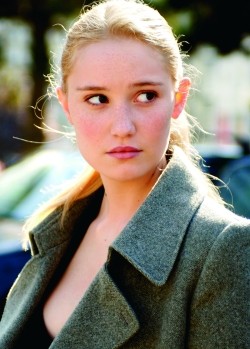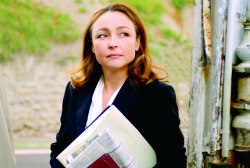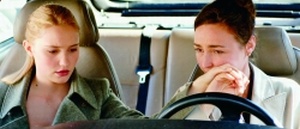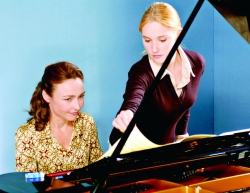W H A T :
W H E N :
Screening at 7:00 pm,
doors open at 6:30 pm
W H E R E :
click for Directions & Map
T I C K E T S :
$6 tickets are ONLY available online, by phone, at the Museum, and at the door subject to availability.
ADVANCE TICKETS:
...and at these locations
($8 tix only, cash only),
click each location below for a map:
Sitwell's Coffee House
513 281 7487
Lookout Joe Coffee Roasters
513 871 8626
Shake It Music & Video
513 591 0123
The Bean Haus
859 431 2326
The discussion after THE PAGE TURNER will be informal and held at Andy's Mediterranean Grill, on Nassau Street near Gilbert Avenue. Join us for conversation and socializing, the beverage of your choice and Lebanese Pizza, baba ghannouj, labneh, falafel, etc., as the spirit moves you! Map and Menu --
www.andyskabob.com 513.281.9791
ON THIS PAGE: |
Ticket Info |
About the Film |
Synopsis |
Director Bio |
Director Comments |
The Music |
Cast |
Discussion |
Festival Screenings |
|

"a thoughtful, provocative, intriguing tale of revenge ... light years ahead of what might be done to the same story in America, or anything you can see in a cineplex near you this week."
~ Larry Thomas, Film Critic WVXU & WGUC

- Best Actress : Catherine Frot
- Most Promising New Actress : Déborah François
- Best Original Music : Jérôme Lemonnier
>>> Watch The Page Turner Trailer
About The Film
THE PAGE TURNER is a beautifully photographed, skillfully understated and elegantly conveyed story of fragility, manipulation and revenge, told in a manner at which the French excel - with beautiful women, erotic overtones and unpredictable plot twists.
FEATURING WORKS from Schubert, Shostakovich and Bach, and with powerful performances from his leading actresses, director Denis Dercourt orchestrates an icy thriller with both brains and malice that explores what happens when one person’s thoughtless deed affects another person’s entire life.
UNLIKE FORMULA HOLLYWOOD efforts, Dercourt weaves this Hitchcockian tale without resorting to standard blood, gore and derivative "scare scenes;" offering instead a subtle and deliberately paced psychological thriller. And while the motivation is shown at the film's beginning, the twists and tension mount as we anticipate the how and when, with Dercourt keeping us in the dark until the final moments.
THIS FILM is a treat for lovers of intelligent cinema. If you find yourself nostalgic for the days of the psychological thriller where a battle of wits is more satisfying than blood, murder and mayhem, THE PAGE TURNER is the film for you.
DIRECTOR AND SCREENWRITER Dercourt, with performance credentials as solo viola with the French Symphony Orchestra and a music educator in viola and chamber music at the National Conservatory at Strasbourg, authentically brings us the elite milieu of French classical music at its highest level, with elegantly gowned radio performances, country chateaux and posh concerts. The essential discipline of music is seen in the screenplay, with measured cadence, pauses and tension balanced against relaxation.

THE SUCCESS OF THE PAGE TURNER is secured by the performance of the female leads, Catherine Frot, the concert pianist, and Déborah François, the page turner.
With multiple César nominations and wins over her forty-plus film career, Catherine Frot (Chaos, La Dilettante, Un air de Famille, Après la Vie, Le Diner de Cons) is one of those graceful, sexy and sophisticated middle-aged women who continue to thrive in French cinema without resorting to Botox or surgical enhancement.
Barely 20 years old, Déborah François made her mark in last year's Cannes Palme d'Or-winning, and César nominated, film from the Dardenne brothers, L'Enfant. In THE PAGE TURNER, François brings a cool maturity to the screen that belies her young age.
Together, their chemistry creates a mounting intensity that builds to a surprising climax.
|
42-year-old Denis Dercourt is a Renaissance man. With a university education in philosophy and political science, he became a musician and a music educator. And then a filmmaker. While THE PAGE TURNER marks his first cinematic presentation at the Festival de Cannes, Dercourt has created several films - five in total - that highlight his knowledge of classical music and examine the lives of musicians through humor and drama. All are variations on traditional genres - a musical comedy, a family drama, a road movie and now a suspense thriller. Born in Paris in 1964, he matriculated at Le Université Paris, gaining a degree in Philosophy, and went on to obtain his graduate degree in Political Science from L'Institut d'Études Politiques de Paris (The Institute of Political Studies of Paris). In 1988 Dercourt joined the French National Symphony Orchestra, where he became the solo viola player. In 1993 he left to join the faculty at the Strasbourg National Conservatory where he instructs in viola and chamber music. FILMOGRAPHY: The Page Turner (La tourneuse de pages), 2006 Floating World (Ukyio, monde flottant), 2005 My Children are Different (Mes Enfants ne sont pas comme les autres), 2003 Lise and Andre (Lise Et Andre), 2000 The Freelancers (Les Cachetonneurs), 1998 Decourt's other films about music and musicians are worth a look. Go here to read more. DIRECTOR'S STATEMENT "The main thread of 'La Tourneuse de Pages' is a story of revenge, but behind it is a growing element of something more ambiguous, where fascination and attraction merge into manipulation. The film is about class revenge and its psychological translation, but since music-making is primarily a physical act, I felt that this revenge also had to be physical, provoking fear and tension as the story unfolds. "It was doubtless the need to keep a safe distance from my own experiences as a musician and my own view of music-making that prompted me to explore the field of the suspense drama, but I was surprised to discover how similar the mechanisms of suspense are to the techniques of writing music: they both include the same ideas of tension/relaxation, slowing down and speeding up, cadences, variations in tempo, pauses, climaxes, etc. "The page turner's role is one of self-effacement: she comes on stage after the soloists, she remains seated for the applause and does not seem to contribute to their success in any way, and yet a page turned too early or too late can upset the whole performance. This potential for danger is even more fascinating because the audience can hardly suspect it. "The challenge of the film lay in the choice of the two lead actresses. They had to express all the ambiguity that I dreamed of for the film: the constant dialogue between strength and weakness, between Ariane, the concert pianist prone to stage fright and the fear of failure, and Mélanie, the girl whose broken dreams now fuel an implacable determination. "Before we began filming, I had visualized using angles and reverse angles to feed the line of tension that I wanted throughout the film, but the film itself decided otherwise. The very first take made me realize that the meetings between Catherine Frot and Déborah François should mostly be captured in the same frame, like a cage in which two wild animals engage in an extraordinary combat." Q & A from the Toronto Film Festival Q You have insisted that the actors be able to play their own instruments. "What's important, too, is that the first time you show them playing, you must show their hands," he smiles. "If you don't, then throughout the film, the audience will be trying to look at the fingers." Q Are the worlds of film and music far apart? "When I direct actors, they always tell me I direct them like musicians," he says. "I am absolutely not intellectual. I ask them to do precise things, like slowing down 10 per cent, or turning 1 per cent to the right. I also write my films like music, always aware of increasing dynamics or relieving tension. On the other hand, when I teach musicians, I tell them how important it is to visualize things and have a beginning, middle and end, just like a film. "The main mechanism in classical music is that of the cadenza," Dercourt says, "a tense chord resolving in another chord; tension, resolve, tension, resolve, and often the release of tension is [creating] another tension. It's the same in a film, especially genre film, and I liked writing this film because I hadn't done that before. That was a real discovery for me." Q Unlike cinema, though, classical music seems to be a dying art. Symphonies are suffering, crowds are dwindling; any thoughts? "Because of my situation, I can see it more than my colleagues," says Dercourt. "What's fascinating is that The Page Turner is a great success in France and the U.K. People are obsessed with this disappearing art because it's a metaphor for a lot of things. What's ironic, though, is that just as the art is disappearing, the players and their interpretations are incredibly good. My students play better than I do now." Q Are musicians particularly prone to becoming psychopaths? "It's a very tiny village, the world of musicians. We are very few, especially at a certain level. Playing music is really difficult, hard work. Like actors, like painters, like all artists they are more aware of their feelings. Also they must be like sports people - they must be always perfect. You cannot fail when you have a concert, you must be aware of your state of mind." Q Who is more dangerous, the child prodigy or the failed musician? "That's a good question," Dercourt says. "When they both are one single person you have to be very afraid." CINEUROPA INTERVIEW Denis Dercourt tells Cineuropa why he decided to take the leap to make THE PAGE TURNER, his first large-scale production. The director has met the challenge successfully to create a low-key thriller, in which he does not lose his sense of originality as an unconventional artist. Q Why did you choose the theme of revenge as a narrative line in The Page Turner? "I wanted to make a quite physical film with two women, and revenge is a theme often dealt with in cinema. I wrote the script while I was in Japan, with such films as An Actor's Revenge by Kon Ichikawa (1963) and Japanese aesthetics in mind, both of which are tense and violent. I set my story in the world of music because I know it well, but that wasn't the most important thing. It was the idea of revenge that interested me the most." Q For your first feature in the world of suspense, you paid particular attention to the rigorous development of the story. "That was a must. First, the story about a very methodical revenge required a very rigorous approach because the audience is linked to the character. And when we play music, we don't leave anything to chance. The script reflects this, with very little padding. But the writing was really great because everything about manipulation is very amusing to write. Is what Mélanie (Déborah François) says meant to be taken at face value or does it have a hidden meaning? Is it said by accident or is it premeditated? This is why I filmed different points of view which, when it came to editing needed to swing constantly between the objective and the subjective. This is a rule of a quite coded genre where the choice of the point of view is very important. When we read the interviews of Hitchcock, we realise that he was obsessed by the subjective and the objective. This is my first thriller and I realised that the rules of writing are very similar to those of music with suspense oscillating from being tense to relaxed, then starting all over. All of this is made in a linear format because I wanted the film to be quite simple. It was necessary to establish from the outset that Mélanie has a potential to be dangerous from the scene where she locks the piano keyboard shut on her fingers and again in the scene with the cello spike, after which the audience is always on their guard. It is minimalist, but I tried to keep the tension and suspense by introducing micro-events, such as the soundtrack, which plays an essential role." Q How did you choose your two actresses? "Catherine Frot normally plays very controlled roles in comedies, but in my film, she plays a character that loses control. Then she becomes really overwhelming. Moreover, she has a lot of respect for music and was trained to succeed in performing with reality everything on screen (even if it isn't the final soundtrack). I give a lot of importance to this almost documentary-like aspect in the filming of the music. I didn't know Déborah François, however. It was my producer who told me about her. I had seen L'Enfant (The Child), we did an audition and it didn't take long to be convinced. She is an unbelievable actress. We worked a lot on her smile, this enigma, the opacity of the character. Finally for Pascal Greggory, even if his role is more of a supporting one, we needed an actor who had a very strong presence to portray the importance of the absent husband." Q How did you work the visual plan? "I wanted to have both Catherine and Déborah in the same field because there was a strong tension between them. My way of filming is a type of captation, a cold and distant style of directing. The fluidity of the camera movements comes from references to genre cinema. I have always had snake-like movements, but it has been linked somewhat to the subject. There is no violence. I wanted the audience to have a tune that continues buzzing in their head after seeing the film." Q Why did you accept for the first time to make a classical production? "At the beginning I wanted to make a film alone with a small team using a Russian camera that I had bought and upgraded to Super 16. I sent a few pages to Michel Saint-Jean with a view to getting the film distributed and because I really trusted his opinion. He suggested that I write a normal screenplay and then he would produce the film. I never did that. The directing was much tougher than what I had been used to, but it was a good experience and it was necessary to a degree, because we needed very good camera work with quality actors and attractive female characters. Everything that is in colour is well thought out so that the audience sees a discreet effect where a certain amount of monochromy has been used without it being repetitive. And all that requires time and money." Q You often film stories about music, which is your job at the conservatoire. Are your films directly linked to these themes? "I like showing what we know and I think a subject has more universal appeal when we talk about one's own area, contrary to what we may think. And then, I film more the work of the music that the music itself. I find that fascinating with the hours of practice and this magnificent auditory framework. There is constraint, beauty, ideas that are ever present. On a personal level, I have directed young professional musicians and the time I spend with them is like training in comparison to my work with actors. As a musician, one is also very sensitive to the relationship with the audience, to the management of time." |

The discipline of classical piano is a very appropriate dramatic vehicle for tension and for suppressed emotion, and director Denis Dercourt heightens the suspense by making us wait for the requisite what, how and when. We know something is coming, but Dercourt's red-herrings deflect what we might assume is an obvious conclusion, resulting in an unexpected outcome. The film opens with the story of Mélanie, a 12-year-old girl from a working class family who has a special gift for the piano. She attempts to pass a prestigious Conservatory's entrance examination but fails, not through lack of talent, but because one of the judges, famous concert pianist Ariane Fouchécourt, is more interested in signing autographs for devoted fans than she is in listening to the audition. Deeply disappointed and bitter, Mélanie gives up the piano. Fast forward roughly ten years. An older, reserved and attractive Mélanie (Déborah François), obtains a seasonal internship in a law office and encounters (by chance?) Monsieur Fouchécourt, husband of the same woman who in the past shattered her dreams of becoming an accomplished pianist. Quickly recognized for her sense of organization and dedication, Mélanie is hired by Fouchécourt as a live-in summer nanny for their son, Tristan. While touring his country estate with Mélanie, Fouchécourt confides that his wife, a well-known pianist, suffers from anxiety and stage fright and has become "fragile" after a car accident - a still unsolved hit and run (hmm...). Ariane's (Catherine Frot), delicate demeanor stems equally from her lost confidence, resulting in uncertain performances that have many questioning whether she should play in public; the fact that she is the beautiful possession of her rich husband; and a hidden loneliness that Mélanie quickly identifies and exploits. 
Entering the classical chamber music concert world in a way she had perhaps not imagined, Mélanie is entrusted with the critical role of page turner at Mme. Fouchécourt's big comeback performance, giving her the power to crush everything Ariane holds dear. But this alone would be too easy, too quick - more appropriate perhaps as an anti-climax - and several intervening plot twists move us ahead, providing other opportunities for Mélanie's seemingly innocent, but menacing, intentions. Throughout the film we see an unspoken but ever-present contrast of social class - Mélanie, the daughter of a butcher, comes from a working class environment while Ariane is married to a wealthy patrician lawyer, complete with country estate and servants. Furthering this perspective, the role of page turner itself is one of subservience, as she who turns the pages on stage remains in the background, seemingly separate from the soloists, staying seated during applause and essentially invisible to the audience. As the film enters its final act, we know Mélanie's intentions are not honorable, but how will they manifest? Through Tristan, through mutual dependence and intimacy, on stage, all of these? Director Dercourt is firmly in control as what lies behind the women's relationship is carefully and delicately exposed, leading to a surprise, and devastating, conclusion. Ariane Fouchécourt, CATHERINE FROT ~~ UN AIR DE FAMILLE (Family Resemblances), LA DILETTANTE, LE DÎNER DE CONS (The Dinner Game), INSÉPARABLES, APRÈS LA VIE, CHAOS, 7 ANS DE MARIAGE (7 Years of Marriage), LES SOEURS FACHEES (Me and My Sister), BOUDU, LE PASSAGER DE L'ETE, ODETTE TOUTLEMOND. Mélanie Provost, DÉBORAH FRANÇOIS ~~ L'ENFANT, (The Child), in production: LES FOURMIS ROUGES and L'ETE INDIEN. Jean Fouchécourt, PASCAL GREGGORY ~~ LA VIE EN ROSE, LA VIE PROMISE, GABRIELLE. Virginie, Ariane's violinist, CLOTILDE MOLLET ~~ THE RED VIOLIN, AMÉLIE. Laurent, Ariane's cellist, XAVIER DE GUILLEBON ~~ L'AUBERGE ESPAGNOLE, THE DA VINCI CODE. Tristan Fouchécourt, ANTOINE MARTYNCIOW Young Melanie, JULIE RICHALET Melanie's father, JACQUES BONAFFE Melanie's mother, CHRISTINE CITTI 
Below is the soundtrack review by Kevin McGann for MusicFromTheMovies.Com. While the review seems written primarily for audiophiles and classical music aficionados, the material provides insight for the casual listener and film fan as well. Bold-face in the text is by CWC, provided as an aid to those who scan for key points. The Page Turner (La Tourneuse De Pages) Composer : Jérôme Lemmonier Label/No. : Colosseum CST 8114 Year of release : 2006 CD release: 2006 Total duration : 52:28 Reviewed by : Kevin McGann Source URL:http://www.musicfromthemovies.com/review.asp?letter=p&ID=6742
As the old French guard of film composers slowly ebb away (Delerue deceased and Jarre retired, although Sarde is still going strong), it's very welcome to see a plethora of new(ish) composers emanating from the land of onions and frog's legs! With Alexandre Desplat garnering lots of attention as he moves into scoring higher profile films and Frederic Talgorn and Phillipe Rombi writing quality music whilst still relatively young, this score may usher in another shining star to the film world.
This arthouse hit from 2006 contains a strong musical score which plays an important role within the fabric of the film. The movie depicts a tale of slow-burning revenge, set amongst the world of Conservatory music. The disc opens with a fantastic cue which is both a blessing and a curse! 'Le Miroir Des Choses' begins with a jaunty piano melody which instantly conjures the sound world of Michael Nyman or Yann Tiersen. This leads into an anguished adagio of yearning regret. A slightly Herrmann-esque refrain leads the listener into the final part of the track and the score's main theme. A repeating three note figure on piano glides over strings in an exquisite manner, conjuring the world of piano lessons and practice. Track 2 is the first of three "classical" source cues (two of which are easily the longest tracks on the CD) by Dimitri Shostakovich, Franz Schubert and Johann-Sebastian Bach respectively. 'Generique' offers fragmentary tinkling of the ivories over strange, hallucinatory sonic asides. A simple 'piano lesson' version of the main theme is performed in 'Prelude de Mélanie'. 'Etude d'Ariane' features more virtuosity on and over the keys. Most of the music sounds exactly like what one would expect to hear whilst wandering the halls of these great French musical Conservatories. 'Doubles Jeux' contains the score's "mystery/revenge" motif, another repeating piano motif over tremolo strings. The latter score cues veer away towards strange, alien-like string effects, more experimental in design ('La Disparition de Mélanie' and 'Le Depart'). The CD closes with 'Diner d'adieu', two minutes of sombre strings and piano which slowly incorporate the main theme. Ten minutes of silence follow until the track hits the twelve minute mark, at which point the listener is treated to the main theme as performed in the film, with dialogue and sound effects. As mentioned, the brilliance of the opening track almost undermines the rest of the score. It pretty much says all there is to say in a wondrous five minutes. There is about 30 minutes of score by Lemmonier and the source cues total roughly 21 minutes. This is high quality film music from a composer who could be an interesting voice to follow. Copyright © 2006, Music from the Movies & Kevin McGann. Adelaide Film Festival, 2007; Alliance Francaise Traveling Film Festival, Australia, 2007; Amsterdam Film Festival, 2006; Bangkok French Film Festival, 2007; Bradford International Film Festival, UK, 2007; Cannes International Film Festival, 2006; Chicago International Film Festival, 2006; Cleveland International Film Festival, 2007; Cork Film Festival, Ireland, 2006; Festival Internacional de Cine de Mar del Plata, 2007; French Film Festival, Lincoln Center, New York, 2006; Edinburgh International Film Festival, 2006; Helsinki International Film Festival, 2006; Melbourne International Film Festival, 2007; Miami Film Festival, 2007; Oslo International Film Festival, 2006; Mill Valley Film Festival, 2006; Moondance International Film Festival, 2006; Palm Springs International Film Festival, 2007; Paris Cinema Festival, 2006; Perth International Film Festival, 2007; Philadelphia International Film Festival, 2007; Portland International Film Festival, 2007; Rio de Janeiro International Film Festival, 2007; Sedona International Film Festival, 2007; Shanghai International Film Festival, 2006; Sydney International Film Festival, 2007; Taipai Gold Horse Film Festival, Taiwan, 2006; Telluride Film Festival, 2006; Toronto Film Festival, 2006; Vancouver Film Festival, 2006; Washington, DC International Film Festival, 2007; Windsor International Film Festival, 2007. |